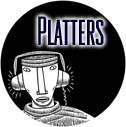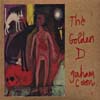
Comment
on this story
Sound Bites
Nelly Furtado
Whoa, Nelly! (Dreamworks)
As Canadian songbirds go, Furtado is more Alanis than Joni, but that's OK. She has a better sense of humor than either of them, as evidenced by "S—- on the Radio": "You liked me 'til you heard my s—- on the radio/ But now I'm just too mainstream for you." She has a pleasantly nasal voice that reminds me of Gwen Stefani, and the album's full of surprises (my favorite is the Kronos Quartet sample on "Hey, Man!"). Dance-pop for people who can think on their feet.
The Presidents of the United States of America
Freaked Out and Small (Music Blitz)
Does it count as a reunion album if no one even noticed they were gone? Doesn't matter. The third time out finds the Prezzies in more or less the same form as before: kinda goofy, kinda catchy, always treading the line between annoying and charming. I can only take so much in one sitting, but some of the songs make me laugh ("I wanna be a jazz guy/ Play black music for white people/ I wanna learn all the chords/ Solo till everyone in the room is bored"), and "I'm Mad" is the most honest break-up song I've heard all year ("I'm mad at me and I'm mad at you/ Aw, can't you see our overwhelming stupidity").
6X
Thunder Bomb (Daemon)
Mrs. Fun
Funsville (Daemon)
Credit where it's due: last week I was less than kind to the Indigo Girls' Retrospective, but whatever you think of their own music, you have to admire the range of releases on Amy Ray's Daemon label. That includes these two. 6X is a one-girl, three-guy rock 'n' roll outfit that sounds a lot like early Joan Jett (and/or the Ramones on the tracks where the boys sing). Lara Kiang snarls like she means it, and the songs (four of which clock in at under two minutes) are old-fashioned fist-pumpers. The cover of the MC5's "High School" fits right in. Mrs. Fun is a jazz-funk duo—Connie Grauer on organ and Kim Zick on drums—whose past releases have come on like an artier Luscious Jackson. Funsville is a departure, all instrumental and improvised in the course of one afternoon with no overdubs. Self-indulgent, sure, and tiring if you pay too much attention. But as groovy background music, it works just fine.
—J.F.M.
|
 |

This week: Two blokes work out their frustrations
Graham Coxon

The Golden D (Trans Copic/EMI)
With his first solo album, The Golden D, Blur guitarist Graham Coxon presents a mixed bag of experimentation that might surprise and dismay those who are expecting more Britpop. Instead, Coxon pays tribute to his heroes of the American underground, particularly the late '80s first wave of post-hardcore.
If you're looking for standard pop melodicism, this album probably isn't for you. The highly processed vocals are usually spoken/screamed rather than sung, with a megaphone quality to them that is reminiscent of disciples of the Albini methodology such as The Jesus Lizard, Cows and Rapeman (natch). The bulk of Coxon's attention is focused on the guitar, which screams and thunders with mathematical precision through the album's 12 tracks.
Melodies are touched on twice, both in Mission of Burma covers. Sure, MOB was an influential band, but perhaps Coxon could have used a bit more discretion in choosing other people's material. "Fame and Fortune" is a rote rendition of the original version, as is "That's When I Reach For My Revolver," which was already skillfully reproduced by Moby a few years back.
Without the aid of a lyric sheet, it is virtually impossible to decode Coxon's vocals. So I'll just assume The Golden D is his artcore experiment—a vexing diversion that has its share of charm. Blur completists and fans of avant rock will love this. But if you're expecting sing-along pop with a heavy debt to the Kinks, I'd suggest waiting for the next Blur album.
—John Sewell
Badly Drawn Boy

The Hour of Bewilderbeast (XL Recordings)
Badly Drawn Boy is a moon-faced English fella named Damon Gough. Or, for the purposes of this album anyway, Damon Gough is Badly Drawn Boy—a sensitive/bitter lad who's just wants somebody to put their arms around his poet's soul. Or something equally muddled; Gough's way with metaphors—"I feed the fishes into me/ It's misty within reason"—leaves a bit to be desired.
Fortunately, his feel for sad, soulful melodies is more fully developed. His memorably titled first album is one of my favorite debuts of the year. He gets compared to Elliott Smith a lot, and it's not hard to see why, especially on a minor-key waltz like "Stone on the Water." He has the same intuitive grasp of McCartney-ish wistfulness, and his more raucous numbers belie a fondness for rocking out (which Smith more than amply displayed during his terrific recent Knoxville show). But I'm guessing Gough isn't a Smith acolyte so much as a fellow traveler. They both belong to a modern school of post-grunge pop that is self-conscious in its pursuit of classic song forms and suspicious of them at the same time. This is music made by people who listened to Nirvana and heard the Beatles lurking inside. In Gough's case, you can add Nick Drake and even Donovan. He draws on the star-crossed, acid-drenched British folk-pop of the late '60s and early '70s, but he gives it more muscle. His songs bristle as often as they shimmer.
The Hour of Bewilderbeast is allegedly a concept album of some sort, tracing the arc of a relationship. I don't exactly hear it myself; Gough is alternately too oblique and too mushy-headed to sustain anything like narrative tension. But taken individually, the 18 tracks (including a handful of instrumental interludes) are full of highlights. The lead-off pair, "The Shining" and "Everybody's Stalking" set a melancholy tone that is largely sustained throughout, although there are plenty of dynamic shifts. "Another Pearl" and "Disillusion" are flat-out rockers, and "Once Around the Block" has a striding jazzy bassline worthy of Van Morrison. Still, it's the sweet and sour melodies (matched by Gough's aching voice) in songs like "Pissing in the Wind" and "Bewilderbeast" that register the most. You don't need the lyrics to hear the heartbreak.
—Jesse Fox Mayshark

November 2, 2000 * Vol. 10, No. 44
© 2000 Metro Pulse
|